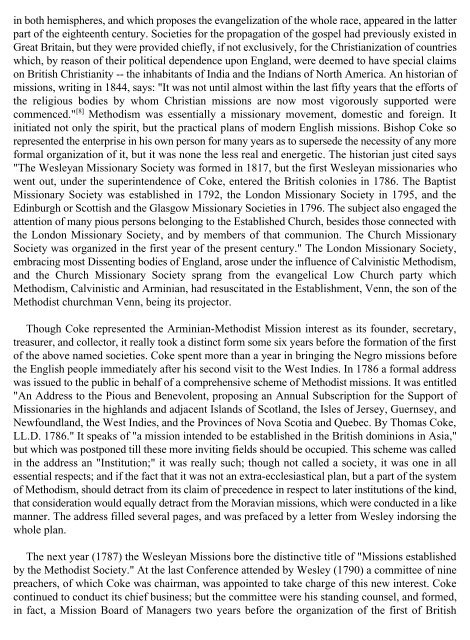History of the M.E. Church, Vol. IV - Media Sabda Org
History of the M.E. Church, Vol. IV - Media Sabda Org
History of the M.E. Church, Vol. IV - Media Sabda Org
Create successful ePaper yourself
Turn your PDF publications into a flip-book with our unique Google optimized e-Paper software.
in both hemispheres, and which proposes <strong>the</strong> evangelization <strong>of</strong> <strong>the</strong> whole race, appeared in <strong>the</strong> latter<br />
part <strong>of</strong> <strong>the</strong> eighteenth century. Societies for <strong>the</strong> propagation <strong>of</strong> <strong>the</strong> gospel had previously existed in<br />
Great Britain, but <strong>the</strong>y were provided chiefly, if not exclusively, for <strong>the</strong> Christianization <strong>of</strong> countries<br />
which, by reason <strong>of</strong> <strong>the</strong>ir political dependence upon England, were deemed to have special claims<br />
on British Christianity -- <strong>the</strong> inhabitants <strong>of</strong> India and <strong>the</strong> Indians <strong>of</strong> North America. An historian <strong>of</strong><br />
missions, writing in 1844, says: "It was not until almost within <strong>the</strong> last fifty years that <strong>the</strong> efforts <strong>of</strong><br />
<strong>the</strong> religious bodies by whom Christian missions are now most vigorously supported were<br />
[8]<br />
commenced." Methodism was essentially a missionary movement, domestic and foreign. It<br />
initiated not only <strong>the</strong> spirit, but <strong>the</strong> practical plans <strong>of</strong> modern English missions. Bishop Coke so<br />
represented <strong>the</strong> enterprise in his own person for many years as to supersede <strong>the</strong> necessity <strong>of</strong> any more<br />
formal organization <strong>of</strong> it, but it was none <strong>the</strong> less real and energetic. The historian just cited says<br />
"The Wesleyan Missionary Society was formed in 1817, but <strong>the</strong> first Wesleyan missionaries who<br />
went out, under <strong>the</strong> superintendence <strong>of</strong> Coke, entered <strong>the</strong> British colonies in 1786. The Baptist<br />
Missionary Society was established in 1792, <strong>the</strong> London Missionary Society in 1795, and <strong>the</strong><br />
Edinburgh or Scottish and <strong>the</strong> Glasgow Missionary Societies in 1796. The subject also engaged <strong>the</strong><br />
attention <strong>of</strong> many pious persons belonging to <strong>the</strong> Established <strong>Church</strong>, besides those connected with<br />
<strong>the</strong> London Missionary Society, and by members <strong>of</strong> that communion. The <strong>Church</strong> Missionary<br />
Society was organized in <strong>the</strong> first year <strong>of</strong> <strong>the</strong> present century." The London Missionary Society,<br />
embracing most Dissenting bodies <strong>of</strong> England, arose under <strong>the</strong> influence <strong>of</strong> Calvinistic Methodism,<br />
and <strong>the</strong> <strong>Church</strong> Missionary Society sprang from <strong>the</strong> evangelical Low <strong>Church</strong> party which<br />
Methodism, Calvinistic and Arminian, had resuscitated in <strong>the</strong> Establishment, Venn, <strong>the</strong> son <strong>of</strong> <strong>the</strong><br />
Methodist churchman Venn, being its projector.<br />
Though Coke represented <strong>the</strong> Arminian-Methodist Mission interest as its founder, secretary,<br />
treasurer, and collector, it really took a distinct form some six years before <strong>the</strong> formation <strong>of</strong> <strong>the</strong> first<br />
<strong>of</strong> <strong>the</strong> above named societies. Coke spent more than a year in bringing <strong>the</strong> Negro missions before<br />
<strong>the</strong> English people immediately after his second visit to <strong>the</strong> West Indies. In 1786 a formal address<br />
was issued to <strong>the</strong> public in behalf <strong>of</strong> a comprehensive scheme <strong>of</strong> Methodist missions. It was entitled<br />
"An Address to <strong>the</strong> Pious and Benevolent, proposing an Annual Subscription for <strong>the</strong> Support <strong>of</strong><br />
Missionaries in <strong>the</strong> highlands and adjacent Islands <strong>of</strong> Scotland, <strong>the</strong> Isles <strong>of</strong> Jersey, Guernsey, and<br />
Newfoundland, <strong>the</strong> West Indies, and <strong>the</strong> Provinces <strong>of</strong> Nova Scotia and Quebec. By Thomas Coke,<br />
LL.D. 1786." It speaks <strong>of</strong> "a mission intended to be established in <strong>the</strong> British dominions in Asia,"<br />
but which was postponed till <strong>the</strong>se more inviting fields should be occupied. This scheme was called<br />
in <strong>the</strong> address an "Institution;" it was really such; though not called a society, it was one in all<br />
essential respects; and if <strong>the</strong> fact that it was not an extra-ecclesiastical plan, but a part <strong>of</strong> <strong>the</strong> system<br />
<strong>of</strong> Methodism, should detract from its claim <strong>of</strong> precedence in respect to later institutions <strong>of</strong> <strong>the</strong> kind,<br />
that consideration would equally detract from <strong>the</strong> Moravian missions, which were conducted in a like<br />
manner. The address filled several pages, and was prefaced by a letter from Wesley indorsing <strong>the</strong><br />
whole plan.<br />
The next year (1787) <strong>the</strong> Wesleyan Missions bore <strong>the</strong> distinctive title <strong>of</strong> "Missions established<br />
by <strong>the</strong> Methodist Society." At <strong>the</strong> last Conference attended by Wesley (1790) a committee <strong>of</strong> nine<br />
preachers, <strong>of</strong> which Coke was chairman, was appointed to take charge <strong>of</strong> this new interest. Coke<br />
continued to conduct its chief business; but <strong>the</strong> committee were his standing counsel, and formed,<br />
in fact, a Mission Board <strong>of</strong> Managers two years before <strong>the</strong> organization <strong>of</strong> <strong>the</strong> first <strong>of</strong> British
















